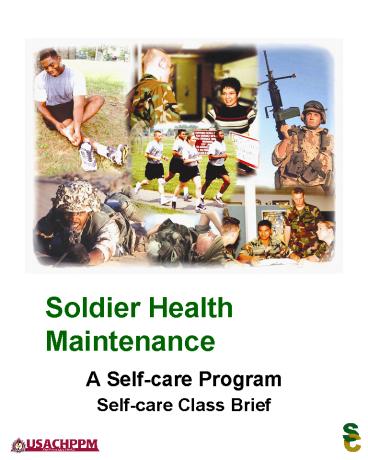A Selfcare Program PowerPoint PPT Presentation
1 / 20
Title: A Selfcare Program
1
Soldier Health Maintenance
- A Self-care Program
- Self-care Class Brief
2
Terminal Learning Objective (TLO)
- Explain healthy behavior practices, describe
what self-care is, and describe how to use the
Self-care Program.
3
Enabling Learning Objectives (ELOs)
- Learn and review health behaviors in order to
help prevent disease and to stay healthy. - Identify minor health conditions or symptoms.
- Review and use the Soldier Health Maintenance
Manual. - Use the symptom evaluation charts.
- Identify components of the self-care process.
- Review a sample green sheet for over-the-counter
(OTC) medications.
4
Part 1 Staying Healthy
- Good Health Basics
- Dental Health
- Food and Nutrition
- Protecting Yourself
- Alcohol Use
- Hearing
- Wellness for Soldiers
- Deployment Medication
- Foot Care
5
Nutrition in the Field
- Good nutrition can mean the difference between
top performance and mission failure. - MREs are made with real food.
- Parts of MREs have extra nutrients.
- When you eat at least a part of all components of
your MREs, you are getting a well-balanced diet. - MREs give you the most nutrition in a small
package. - Make sure you drink plenty of fluids.
6
Dietary Supplements
- Traditional vitamins and minerals, herbs, amino
acids, powders, teas, and energy bars.
- Supplements are NOT regulated for purity and
safety as are food or drugs. - Natural doesnt necessarily mean Safe.
- They can interact with other prescribed drugs,
supplements, or caffeine or hydration status to
cause dangerous side effects.
7
Mental and Emotional Fitness
Resources for Mental Health
- Chaplains
- Commanders
- Community health nurses
- Counselors
- Drill instructors/ cadre
- Doctors and health care workers
- Psychiatrists
- Psychologists
- Social workers
- Spiritual advisors
8
Physical Fitness, Activity, and Readiness
- Impacts combat readiness.
- Fit soldiers are much less likely to get physical
injuries. - Soldiers must meet APFT standards by the end of
training cycle.
9
Sleep
- To get a good nights sleep
- Avoid coffee, tea, cola, or other drinks with
caffeine 4-6 hours before bedtime. - Avoid tobacco products before bed or during the
night. - Avoid alcoholic beverages 4-6 hours before bed
time. - Avoid large meals.
- Avoid strenuous exercise right before bed.
- Keep your sleeping area dark, quiet, and a little
cool.
10
Sun Safety
- Use sunscreen with a Sun Protection Factor (SPF)
of 30 or above. - Use your uniform to cover your arms and legs.
- Wear sunglasses that block UVA and UVB rays.
- Use the rule Short Shadow? Seek Shade!
11
Alcohol Use - CAGE Test
Ask yourself the following questions
- Have I made unsuccessful attempts to cut down on
drinking? (Cut down)
- Have I been criticized for drinking and become
annoyed? (Annoyed) - Have I felt guilt about drinking? (Guilt)
- Have I used alcohol as an eye-opener in the
morning? (Eye-opener)
12
Substance Abuse
- Hurts your physical and mental health.
- Decreases combat readiness.
- Hurts mission completion.
- Affects safety in the workplace.
- Hurts relationships with family and friends.
13
Hearing
- Soldiers use their hearing to
- Detect movement through brush.
- Determine where gunfire is coming from.
- Conduct radio communications.
- Hearing loss could put your life and the lives of
your unit in danger in a combat situation. - Hearing loss caused by noise is
- Permanent.
- Cannot be medically corrected.
- The Army has free noise muffs, earplugs, ear
canal caps, and protective helmets. - Cotton or tissues are not hearing protectors.
14
Injury Prevention
- Listen to your body. Overuse injuries start out
with a pulling feeling and progress to pain
after the activity. - Use protective equipment including
properly-fitted running shoes when playing sports
or exercising. - Warm up to prepare for activity.
15
Sexual Responsibility
- Being responsible about having sex helps you
- Avoid sexually transmitted diseases (STDs).
- Avoid unintended pregnancy.
- Best protection - not having sexual intercourse
of any kind (vaginal, oral, or anal).
16
Tobacco Use
- Smoking greatly increases your chance of getting
a physical injury.
- You can get hooked on tobacco products.
- Tobacco use
- can cause serious health problems.
- can also hurt your performance.
- reduces night vision.
- If you are a tobacco user, the most important
thing that you can do for your health is to quit.
17
Vision
- Follow eye safety signs and procedures.
- Always wear approved eye protection.
- Do not wear contact lenses where there is smoke,
dust, or fumes. - Know where the nearest eyewash station is and how
to use it. - Report eye hazards to your supervisor.
- If someone gets an eye injury, call emergency
medical services immediately. - When outside, wear sunglasses that absorb the
suns harmful UV rays.
18
Foot Care
- Healthy feet are important to a marching soldier.
- Keep your feet clean and dry.
- Trim your toenails properly.
- Wear clean, dry socks.
- Change your socks at least once a day.
- Wear proper shoes/boots for every activity.
- Foot pain is not normal, dont ignore it.
19
Hot Weather Safety
- To prevent heat injury, drink plenty of water.
- When exercising or training outdoors, wear
lightweight clothing that lets air flow through. - Avoid sunburn.
20
Prevent Cold Injury
- Clothing should be worn in loose layers.
- Keep clothing clean and dry.
- Keep hands and feet dry and well-protected by
wearing proper hand/foot gear. - Keep moving when possible exercise to stay warm.

